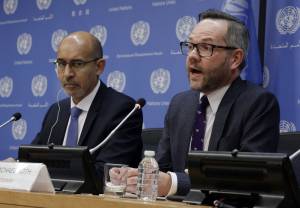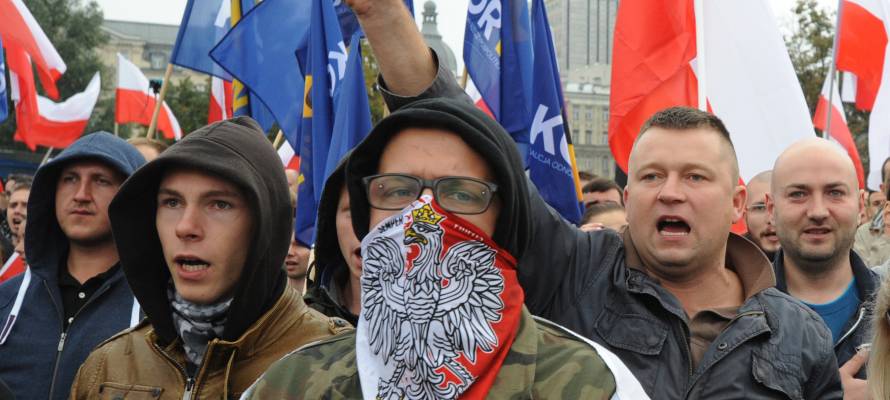Anti-Semitism in Europe is on the rise and rooted in its traditional source, the extreme right-wing, which expresses an outward level of anti-Muslim sentiment and support for Israel to “whitewash” its anti-Jewish leanings, says Israel’s Channel 10 chief international correspondent Nadav Eyal.
Eyal, who is touring the U.S. to discuss his documentary “Hate: Into the Heart of Anti-Semitism” joined the World Jewish Congress at its headquarters in New York on Thursday to speak to members of the Jewish Diplomatic Corps and guests from the Israeli consulate.
“Most of the [recent] attacks stem from young Muslim teenagers, but if you look at the serious incidents, political influence, the bigger problem is the extreme right-wing. We have to remember that the extreme right-wing has had power for a long time and thrives on the coming of the Muslims. They are trying to whitewash themselves of racism by supporting Israel,” Eyal told the WJC forum.
The Israeli journalist spent a good part of the last year traveling to major cities in Europe, meeting with some unlikely sources: neo-Nazis and influential members of far-right movements, including Greece’s Golden Dawn, to take a deeper look at the growth of anti-Semitism on the continent.
For Jews in “certain” parts of Europe, life is becoming increasingly uncomfortable, Eyal said. In many countries, such as France, Jews are reluctant to show any public expression of their Judaism for fear of repercussions. Soldiers still stand outside schools and Jewish institutions, where threats of attacks are very real.
The right-wing has coupled its hatred for Jews with its hatred for Muslims, using campaigns such as outlawing kosher and halal slaughter, in a bid to target both groups at once. Some of the archetypes used by Nazis during the WWII-era are now being used against Muslims, Eyal said, such as the image of an innocent blond woman standing with a swarthy man with a long nose – yesterday’s Jew, today’s Muslim. “The archetypes work,” Eyal said. “We should be using these people to expose that hatred is based on lies and that it cannot be contained.”

France’s State Secretary for European Affairs Harlem Desir , left, and Germany’s Foreign Minister Michael Roth, speak at the UN General Assembly’s first-ever meeting devoted to anti-Semitism. (AP/Richard Drew)
While the rising power of the right-wing is the major source of threat, the anti-Israel boycott movement (BDS) has added flames to the pyre, as it inherently implicates Jews in every Israeli policy.
“When Jews support Israel in an environment where Israel is not supported, they are labeled as Israeli agents. They are perceived as the Israeli community,” said Eyal.
Nevertheless, “it would be inaccurate to say that everyone who boycotts Israeli goods is anti-Semitic,” Eyal added. “Many people who operate within the BDS framework have anti-Semitic views. But I don’t count people who have a problem with the occupation as anti-Semites. I do count people who have a problem with Jews.”
During his visits to Europe, Eyal also followed “refugee trains” of Muslims arriving from places like Syria, Afghanistan and Iran to uncover the possible implications the refugee crisis may have on Jewish communities in Europe.
While some of the refugees he spoke to, particularly those from Syria, perceived Israel as supporting its enemy (be it Assad or rebels), others were grateful for Jerusalem’s own opposition to the regimes from which they themselves had fled. Many of these refugees are moderates – “people who we would want to stay in the Middle East,” said Eyal – though many of them do undergo a process of radical Islamization after getting settled in Europe.
Over the last week, Channel 10 has broadcast segments of this footage for 20 minutes daily during its prime time news hour. Ratings for these segments have been through the roof, no small feat considering the terror wave occupying Israeli minds and media of late.
During his investigations in Europe, in the heat of the refugee crisis and on the heels of deadly attacks against Jews, Eyal found that racism and hatred are thriving on the continent just as they have for centuries. “We’re all racist to a certain extent,” Eyal said. “The only question is do we bring this racism into our behavior, our language our actions? Or do we understand that it’s wrong?”
By: WJC
